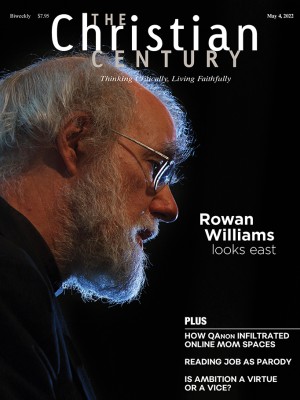Everyone has something. We’re all afflicted by some illness, some hardship, some shame, some dysfunction. You may never know it, watching the streams of people who seem to be healthy and whole pass you by. And not all afflictions are on the same scale. But you can count on it. Everyone has something.
Why then doesn’t God heal us all?
Of all the challenging aspects of Christian theology, I find this question is one of the hardest to resolve. It’s a question confirmation students ask, only to have adults give unsatisfying answers that have something to do with “free will” and “God’s mysterious ways.” It’s the question of theodicy—Why does a powerful, loving God allow suffering?—with the knife twist of inequality: wait, some aren’t suffering as much! And look—some are actually being healed!
Read our latest issue or browse back issues.
Our Gospel scene begins with a crowd of invalids, all who presumably have come for healing. They flock to the special pool near the sheepgate, hoping to get lowered into the water early enough in the day to be made whole. The mechanism for healing doesn’t make sense to modern ears. An angel stirred up the pool. Truly, no one knows how that worked. Regardless, we can appreciate the dynamic it set up, with people jockeying for position and throwing some elbows as they clamored to be the first ones into that pool.
I think of the long hours I have waited in emergency rooms, watching people who showed up after me get treated first. It’s maddening. I think of the two years of COVID that we just lived through, in which the original unifying rallying cry—“We are all in this together!”—turned quickly into civil conflict the likes of which has not been seen for a generation. I think of pervasive inequalities that affect well-being at every level. It’s not just people who need healing; it’s the whole broken world.
Early in the pandemic, a church member plainly described why she thought that if she got COVID, she would die. Given her age and health history, she would not qualify for a ventilator—and she said this was as it should be. It was a gracious, open-eyed attitude. But my goodness, what a world we live in when we know that the mechanism for healing is there, there’s just not enough of it.
I hear a lot about the theology of abundance. Indeed, it is an attractive, scripturally sound, gospel-centered antidote to the worst instincts of competition, capitalism, and scarcity thinking. But we are glossing over something hard about the scriptural witness to Jesus—not to mention the reality we live with—if we think abundance is always God’s modus operandi. God does not heal everyone who cries for help, at least not this side of the resurrection. Just so, God does not call everyone into Christian community, nor give everyone the same capacity for faith.
I would have written the healing story in John 5 differently. I prefer a “loaves and fishes” kind of miracle story, where every single person waiting by that pool walks away healed and whole. Instead, Jesus singles out one man and gives him his full attention. There’s no clue as to why, except that he has been there a long time. Lots of commentators surmise that he is the only one who responds to Jesus’ offer for healing, but that’s not in the text. It remains a mystery. Why him? Why only him?
I’ve found no completely satisfying answer, but I do think a few details help soften the edges of a hard problem. First, without some help, the poor guy at the sheepgate has no chance; he’s destined to always be at the back of the line. It strikes me that he doesn’t necessarily need a supernatural miracle. No, he needs a friend. He needs more pools. He needs a different system. Not all suffering can be solved by creating better human systems of justice, mercy, and care. But our society can do much better than we are doing.
I also notice what happens next. Because this takes place on the sabbath, the healed man is confronted by those who question its legality. But it’s not a coincidence that Jesus heals this man on the sabbath. It is part and parcel of the point. The sabbath is not only a day to refrain from work but also a day to shift the balance toward equality. Through this instance of individual healing, Jesus disrupts the whole competitive system at the pool. I do not know why God only heals some people. But I do know that God has healed me, in ways that people wouldn’t call miraculous or supernatural but that seem so to me. God has healed depression, brokenheartedness, financial insecurity, grief, sexism, doubt. Like the man at the sheepgate, I have been healed not only for my good but for the hope-filled proclamation that God can work miracles.
There’s power in lifting out the individual story from the common afflictions. Jesus’ life is embedded in specific relationships, places, and times. The grand sweep of God’s love may be universal, but the application is personal. Jesus deals in particulars. We do too.
Churches aren’t in charge of health-care policy, but we can cultivate something different from the competitive healing mechanism that churns through our society. The church gets to pay attention to the condition of individual people and to confront merciless systems. The church gets to expand the definition of healing. And the church gets to be honest. A world in which God does not heal everyone is challenging and difficult. Still, like the man at the sheepgate, faithful people wait in hopeful expectation that someday, all will be made well.






